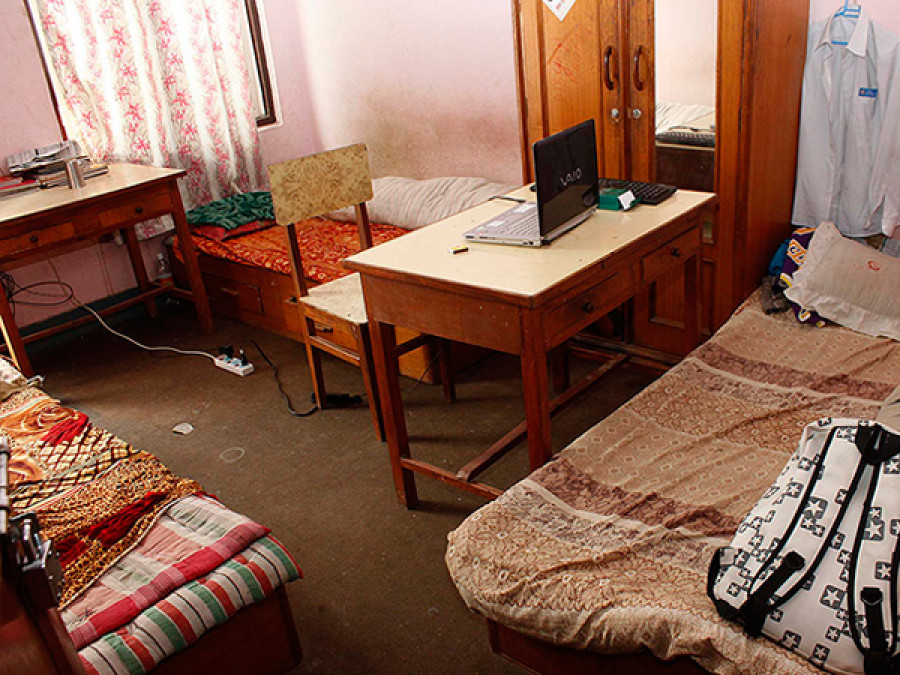National
Lockdown leaves private hostel owners, students in a fix
Hostel operators seek help from the government and money from students to stay afloat. But the government hasn’t helped, and students themselves are under financial stress.
Samiksha Baral
When the government was gearing up to impose a nationwide lockdown in March, Sona panicked and called her family in Panchthar. The 19-year-old college student, who wanted to return home immediately, packed all of her belongings as she didn’t know when she’d return to Kathmandu and left.
“I thought of returning to Phidim and left the room because I wasn’t sure when I would get back,” said Sona, who had been staying at a private girls’ hostel in Hattiban, Lalitpur for nine months. “I had to leave and return to my family,” she said from her home in Phidim.
Sona and her family were surprised when she got a call from the hostel manager asking her to pay her hostel fees, amounting to Rs 10,000, for April and May. “I was asked to pay for the room which I had vacated before returning to Phidim,” she told the Post.
Sona is one of the thousands of students from across the country who come to Kathmandu to pursue their higher studies and stay in privately-owned hostels as they provide accommodation and food at affordable rates. Also, private hostels allow them the freedom of choosing suitable locations to stay nearby their schools and colleges and only focus on their studies as their lodging, flooding and laundry are taken care of by the hostel.
According to Nepal Hostel Association, the organisation of hostels in the country, nearly 30,000 students were staying in the 825-odd private hostels in the Kathmandu Valley alone before the pandemic. The association said over Rs 2 billion has been invested in hostels across the country that provide jobs to 5,000 people.
The association decided to shut down hostels from March 22 after the government suspended all non-essential services and activities.
As a large number of students returned home before and after the lockdown was imposed, hostel operators, who need to pay the rent for their multi-storey houses and salaries for various staffers, find themselves in financial trouble. The impact of the lockdown, like every other sector, has been severe on the hostel businesses. Unable to cope up with the back-breaking financial stress, some hostels have been forced to shut down after students deserted them.
“We are running the hostel in a rented building for which we have to pay Rs 60,000 per month to the house owner,” said Prem Bhattarai, manager at GPA, the hostel where Sona was staying. He said he had no option but to ask students for their fees as three months of lockdown has taken a heavy toll on his business.
Bhattarai told the Post, “Paying the monthly rent is difficult for us if we don’t collect fees from students. It’s our only source of income.”
Considering the impact of the pandemic and the lockdown, the association recently issued a circular to its members to ask students to pay only half of their normal monthly fees, said Bhakti Pathak, the chair of the association.
Bhattarai said that his hostel has been charging students even less than half of the normal fees. But one resident of the host, who didn’t want to be identified, said this wasn’t the case. Although the fees have been reduced, they have not been cut by 50 percent, as claimed by Bhattarai.
The hostel fee for a room ranges from Rs 7,000- Rs 12,000 and the amount can even go up depending on the service provided and the number of occupant.
The ongoing crisis, which has affected middle-class families’ income sources, has created an additional financial burden on students, especially from marginalised sections already struggling to pay college fees.
“The effect of lockdown has been harsh on our family,” said Sona. “My father’s transportation business has remained completely shut for more than three months now. And given the situation, it’s really difficult for me to ask him for my hostel fees ,” she added.
Despite the circular from the association, hostels across the valley are charging students different fees.
Joseph Thapa, an engineering student from Hetauda staying at New Advance Hostel in Buddhanagar, said his hostel has asked him to pay Rs 2,500 per month for the lockdown period.
“But my friend, who was paying about the same fees as mine before the lockdown, is being charged Rs 5,000,” said Thapa.
Balika Poudel, the operator of New Advance Boys’ Hostel has asked students to pay only 25 percent of their fees. “I can’t ask more than this amount. I am surprised that hostel associations decided to ask for 50 percent of the fees even when the students have not lived in the hostels for three months,” said Poudel.
“The pandemic has exacerbated challenges for both the hostel owners and the students. The impact is likely to last for a long time even in the aftermath of the lockdown.”
Ishwor Lamsal, the operator of a Putalisadak-based hostel that catered to over 100 students, shut his business. “We had 35 female and 75 male students in my hostel,” said Lamsal. “I had to close the boys’ hostel on May 22 and the girls’ section in the first week of June.” Although all students have gone home, he still has a huge sum to pay the landlord.
“I have to pay more than Rs 250,000 in rent for the hostel building and the landlord has been demanding that I pay him at the earliest,” said Lamsal, “For a person like me living in a rented room, I cannot afford to clear my dues unless I collect fees from students.”
Lamsal said the government turned a blind eye towards hostel operators who have been affected by the lockdown. “The government rolled out relief packages for all sectors, except for hostels that employed so many, took care of students and helped them excel in their studies.”
“Despite paying taxes to the government regularly, it did not do anything to help the hostel operators.”
While the hostel operators seek the government’s help to get back on their feet, students are calling on hostel managers to understand the students’ problems. Sona, meanwhile, said she doesn’t know when she’ll be able to return to college as things still look uncertain. “I think during these extraordinary times the hostel operators should also understand the situation of the students.”



 22.65°C Kathmandu
22.65°C Kathmandu













